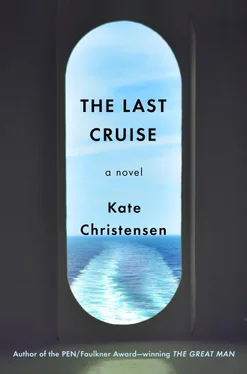As he made eraser donuts on the tabletop, Laurens described in his flat voice the adventure they were about to embark upon together, re-creating the menus of a once-grand ship for its last cruise. This was clearly his attempt to inspire slavishness in the breasts of his peons for the duration of the voyage. He wanted to win them over before he scared the shit out of them, classic cult recruitment love-bombing. Looking around at the faces of the troops, Mick had to admit he was doing a pretty good job. These multiethnic kids, most of whom had likely never heard of half these dishes, actually looked eager to cook Welsh rarebit and consommé madrilène under the direction of this pale despot.
Laurens reached into a satchel by his feet and pulled out a fat, worn book. He held it up so everyone could see it.
“ Mastering the Art of French Cooking. You all know it?”
The room erupted with nods.
“This is your bible,” he said. “Everything is in here. As you know, Julia Child was a stickler and her recipes are formidably labor-intensive. But this is our book for the next two weeks. Every staff dinner, we will say a prayer to the late great Julia. Now for the buffet.”
He consulted a paper at his right elbow.
“Miklos Szabo,” he said, pronouncing it perfectly. “Why don’t you tell us what you’ve got planned.”
Mick raised his hand. So he was on buffet. Good to know. Laurens fixed him in his sights as Mick cleared his throat. Every face in the room turned toward him, every set of eyes fixed on him.
“Call me Mick,” he said, unsmiling, playing the gruff but fundamentally good-hearted Eastern European bloke whose good side you wanted to be on because you didn’t want to see his bad side. He knew the theatrical power tropes of the professional kitchen as well as anyone. “Hello, Chef, everyone.”
He spotted a couple of kids who’d worked under him before, good kids who caused no trouble. He looked at everyone’s face for signs of incipient flaws, potential for insurrection. He saw only shiny eyes, neatly groomed heads, spotless uniforms, perky neckerchiefs, like a scout group, a fresh-faced crew for the old Isabella ’s swan song.
“Chef Laurens has laid out the main dining room menu,” he went on. “So let’s talk about the buffet.” He lifted one side of his mouth in a half smile to stall for the second or two it took him to shake a plan loose from his gummed-up brain. For a bad split second, his mind went blank. Then he opened his mouth, and words came out. “Tonight we’re going to bring together two fun food trends from the era of this ship’s first cruise: Hawaiian and barbecue. Since this is a Hawaiian cruise, right?”
He took a breath, trying to decide how much of a lecture he should give them.
“When soldiers came home from the South Pacific,” he said, “postwar Americans discovered canned pineapple, their fencepost drug to Hawaiian cuisine.”
“Gateway,” muttered the girl who’d come in late.
He ignored her and went on, trying to sound knowledgeable, like a leader. “And barbecue had become very popular as well in the suburbs, not the slow-smoked kind, but Dad grilling meat over coals on the patio while Mom made cold salads like macaroni, Jell-O, and potato. This postwar America was a very nice place. We want our passengers to experience that. Now, times feel less safe, much less secure.”
He sensed a bit of restlessness.
“Tonight,” he said, and they snapped to attention again, “for our welcome buffet, we’re offering a suburban version of a Hawaiian cookout, like a luau, but with suckling pigs on spits instead of the whole pig cooked in a pit on a beach. Pineapple spareribs, fried rice, we’ll do shrimp kebabs and grilled mahi-mahi with a fruit slaw, fruit everywhere, in salads and centerpieces, flowers. And we’ll have ukulele music and tiki torches and dancers in grass skirts. Someone needs to coordinate with the entertainment director.”
While he talked, Mick felt himself returning from his exhausted walkabout in the nether regions of his psyche. His dream of swimming underwater with all those large fish had been about his job. It had been about fourteen- or sixteen-hour days belowdecks in the steamy kitchen bumping up against other cooks, not needing to surface or even breathe, not needing to leave his medium for any reason, because, he remembered now, this was where he felt most at home, his natural habitat. He was ready for this.
The meeting swept on. When it was over, and everyone had dispersed to work in the galleys, to find their quarters, to hammer out unfinished contractual business in the main office, Chef Laurens looked at Mick and summoned him over with a tip of his head.
“The person who was late,” he said. “Please deal with her appropriately. Make sure she knows that is unacceptable on my ship.”
“Yes, Chef,” said Mick.
“I don’t know you. You’re with Cabaret?”
“For the past eight years,” said Mick. “I just came off five months in the Caribbean and the Bahamas on the Illusion. ”
“Ah,” said Laurens. “That explains it. Well, this should be a cakewalk. Four hundred passengers and no tricks.” He sniffed. His freckled pale nose twitched slightly, but he didn’t sneeze. He pushed his glasses up on his nose. He was a gangly, weedy schoolboy, by all appearances. It worked to his advantage, so that when he struck, it would be as terrifying as a meek rabbit attacking viciously out of nowhere with a snake’s fangs.
There was nothing further. Mick was apparently dismissed. Okay, then.
He walked to the window of the buffet room, taking out his phone. There was a signal here. He dialed: it was early afternoon in Paris.
“Meek,” Suzanne said in a breathy exhalation. “Allô, chéri.” She was in bed with someone. The guy was right there, maybe even fucking her while she held the phone to her ear. And meanwhile, her caller ID had told her it was Mick, and she’d picked up the phone. “Just a second. Hang on.” He waited. What was she doing? he wondered. Getting out of bed, leaving the guy there to wait for her to come back when she finished with her call. Throwing her robe on over her naked body, tossing her hair back, lighting a cigarette, opening the casement windows and stepping with the phone onto her little balcony, out into the skin-tingling chill of a spring day in Paris.
He should have been there; he should have been the one fucking her. This call was costing him a lot of money, and for what? It was torture.
Her voice came back to his ear then. “Allô?”
“I’m calling to say goodbye,” he said.
“So you are going. For how long?”
“Two weeks. I could be in Paris by May fifth.”
“May fifth,” she repeated. She hesitated.
It wasn’t enough. He loved her. He couldn’t take it anymore.
“Or maybe I won’t come,” he said. “I don’t know. I should go to Budapest and see my father.”
“No,” she said. “Come, we’ll figure it out.”
They always spoke English, although Mick’s French was passable. He was used to it; English was the lingua franca on the cruise ships too. He only ever spoke his native language with fellow Hungarian crew, when there were any, which was almost never.
Suzanne was a philosophy professor at the Sorbonne, of all the unlikely things. She was ten years older than Mick, quintessentially French, cerebral and unsentimental, highly sexual but not especially sensual. She loved to fuck, that was all. Mick looked tough and solidly practical, a hardworking Magyar, but he was a secret cornball romantic who swooned at beautiful music. He was smart enough, he’d read books, but he was no university professor. They were unsuited to each other in every way that he could see, and yet he adored her, heart and soul, and he thought she loved him back, in her way. They’d met in Bali five years before, and since then, he visited her every chance he got. Meanwhile, she slept with whomever she pleased and assured him it didn’t matter. He slept with no one and assured her it did. The thought of her with another man made him implode with jealousy, but there was nothing he could say: he lived at sea. She owed him nothing. They’d exchanged no assurances of fidelity, ever, and he told himself with stalwart, difficult fairness that he had no right to ask that of her.
Читать дальше












